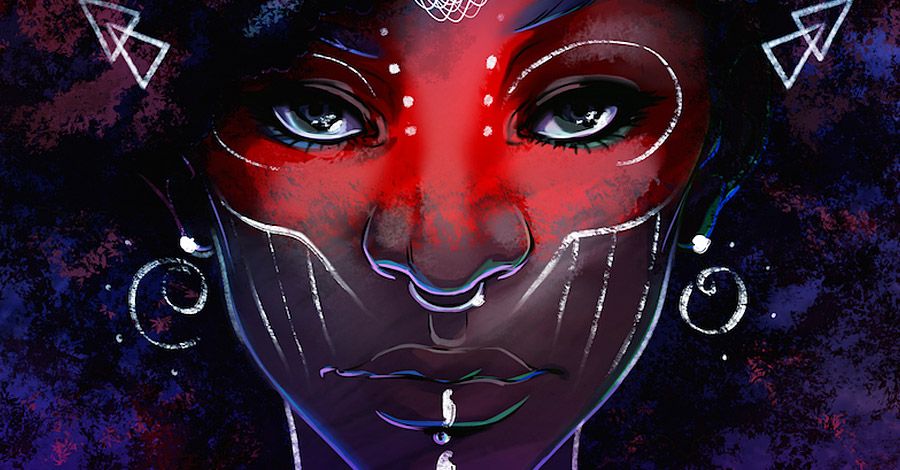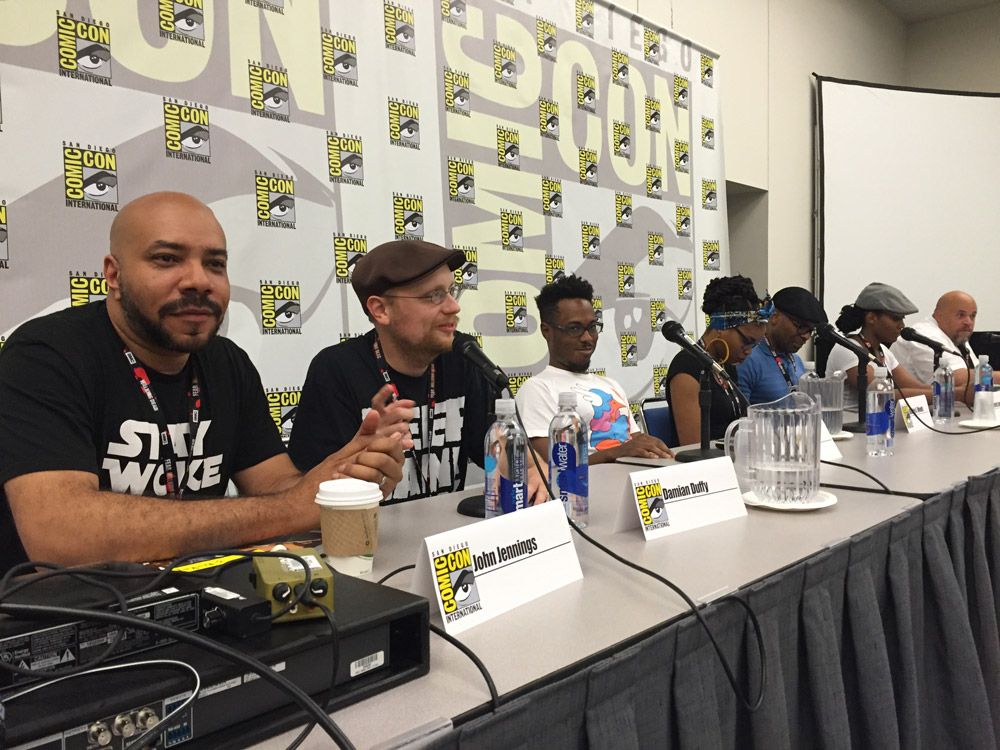As it turned out, the title of the Black Comix Returns panel at Comic-Con International in San Diego was a spoiler; the panel kicked off with the announcement by editors John Jennings and Damian Duffy that they are putting together a second volume of "Black Comix," which will be published by Magnetic Press and partially funded by a Kickstarter. The first book was a hardcover anthology published in 2010. "We were thinking of bringing the first one back to print, but black comics culture has grown by leaps and bounds," said Duffy. The new volume will feature a new lineup of artists, including all the panelists as well as Afua Richardson, Ed Piskor, Keith Knight and Jimmie Robinson, among others. The Kickstarter will launch in September.
Jennings won an Eisner Award this year as co-editor "The Blacker the Ink: Constructions of Black Identity in Comics and Sequential Art." He and Duffy are comics scholars, curators, and creators, and the panel they assembled included creators doing a wide range of work.
- David Walker, writer of "Power Man and Iron Fist" and "Nighthawk," as well as the upcoming Occupy Avengers, all from Marvel, and a BOOM! Studios/Dark Horse crossover, "Tarzan on the Planet of the Apes." "There's no fixing him," Walker said of the long-lived jungle-based character. "The only way you can do it is to put him on the Planet of the Apes."
- Shawna Mills, who is currently working on "Star Wars Rebels."
- Jeremy Love, creator of "Bayou," which was originally published by DC's Zuda imprint; he is now working on a new series for Dark Horse, "The Black Lotus."
- Ashley Woods, artist of "Niobe: She Is Life." She will also be doing covers for "Vampire Hunter D"; the audience greeted this news with excited "oohs".
- Ronald Wimberly, creator of "Prince of Cats," which was originally published by Vertigo and will be coming out in a new, larger edition from Image; "Sunset Park," also from Image; and "Grat Nin," a digital comic for the Stela app. Wimberly holds the Thurber Graphic Novel Residency in Columbus, Ohio, and the Columbus Art Museum will have a retrospective of his art from September to February.
The discussion revolved around questions of diversity, empowerment, and the commodification of art and identity in the evolving comics industry.
"In a way, you are valued for your blackness," Wimberly said, "but it's a catch 22 because when you commodify it... you may end up playing to the performance of blackness to sell that commodity. And there are people who perform a certain type of blackness because it is a more valuable commodity, as opposed to a more nuanced and organic type of identity that someone has."
For instance, when Wimberly pitched "Sunset Park" to an editor, the response he got was, "I was thinking something more like Wu Tang meets werewolves."
"That's the spectacle of black identity that he was used to, that he knew how to package and box and sell, that white audiences can consume," said Wimberly.
"I think, as a black female, a lot of times people think they know where you are going to be coming from, what you are going to do or say before you do it," said Woods. On the other hand, because her name is similar to Ashley Wood, many people think she is a white man. "Even if they didn't know about that person, just seeing my work, [they say] they wouldn't expect that from a black female." While she doesn't think that attitude is fair, she also said that her outlook on expectations is, "damned if you do, damned if you don't."
"It seems like the very act of being a black creator is automatically political," Love said. "I just wish sometimes that I didn't have the burden of every artistic choice I make being scrutinized on the political level. Sometimes they are just strictly creative choices."
"I just do what the hell I want," said Mills, a statement the audience greeted with applause. "It sounds pretty vague, but I guess I've never been that kind of person to fit or try to fit into something, whether it was the circle of my sisters and brothers or the circle of whoever that is. I was always very independent. I don't see myself ever conforming."
"I don't believe I write anything political," Walker said, although he admitted that others disagree with that statement. "As artists, so much of what we carry around with us comes out [in our work]. Am I putting Black Lives Matter stuff in my work because I'm trying to make a statement about Black Lives Matter? Well, yeah. Black lives matter, and it's something that needs to be talked about, but it's not a political statement. That's an assertion of our right to be human beings. My one goal as a creator is to help us hold on to the humanity that is constantly being denied to us."
"I don't want to conflate the discussion of comics as a commodity and identity as a commodity," said Wimberly. "Of course comics are a commodity, but when the one way you can even sell your comics is on the back of your identity as a commodity, then that could be problematic." For example, Wimberly cited an unnamed editor who only calls on him for Black History Month. "At a certain point ,you get the urge to [say], 'I work all year round. And hey, maybe I just want to do a romance story,' but somehow that becomes politicized and somehow they find a way to commodify the blackness of that."
Jennings shifted the conversation to diversity and how the black independent comics movement is dealing with it. "Everyone wants something fresh, and different audiences want to be represented, they want to see themselves," said Woods. "I'm a part of that, and that's why I do what I do today." That affects the way hiring is done. "Some people would get first pick of jobs, and that's no longer the case," she said. "They are not too happy about it, but at the same time, the door is opening for other artists such as ourselves. It's bittersweet."
"The good thing is the companies are responding to the readers' demands" Love pointed out. "It is not going to fly just to have a few black superheroes and Latino superheroes. Now, everyone is looking at who's drawing it, who's writing it, behind the scenes and in front. I just hope that we get from a black female Iron Man to more things like 'Prince of Cats,' things that are truly original, not the black version of a 60-year-old [character]... I look forward to the day when a black female Iron Man comes on the scene, and there are no editorials about it. It just happens."


